
Juan Luis Guerra Seijas is a Dominican musician, singer, composer, and record producer. He has sold 15 million records worldwide, making him one of the best-selling Latin music artists. Throughout his career, he has won numerous awards including 24 Latin Grammy Awards, three Grammy Awards, and one Latin Billboard Music Award. He won 3 Latin Grammy Awards in 2010, including Album of the Year. In 2012, he won the Latin Grammy Award for Producer of the Year.
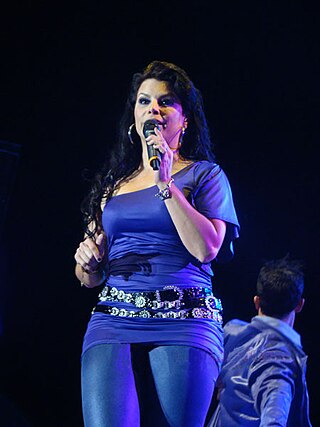
Olga Teresa Tañón Ortiz is a Puerto Rican singer-songwriter. Over the course of her career, she has earned two Grammy Awards, three Latin Grammy Awards, and 29 Premio Lo Nuestro Awards.
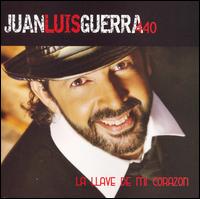
La Llave de Mi Corazón is the 10th studio album recorded by Dominican singer-songwriter Juan Luis Guerra, It was released by EMI Televisa Music on March 20, 2007. It was Guerra's first album to contain songs in English since his 1994 recording of Fogarate. The album contains fusions of mambo and tropical rhythms that Guerra himself defined as "Mambo merengue". Its production and musical structure of album is based on merengue, bachata and salsa and encompasses elements of Blues, Son, Jazz, Mambo and Bossa Nova. The album was written, arranged and produced by Juan Luis Guerra and according to the artist is his most romantic album. It is composed of four merengues, two bachatas, three romantic songs and two salsas.

Bachata Rosa is the fifth studio album by Dominican singer-songwriter Juan Luis Guerra and his group 4.40. It was released on 11 December 1990, by Karen Records. It brought bachata music into the mainstream in the Dominican Republic and gave the genre an international audience. A Portuguese version of the record was released in 1992 under the title Romance Rosa; it was certified gold in Brazil. The album received a Grammy Award for Best Tropical Latin Album and two Lo Nuestro Awards for Tropical Album of the Year and Tropical Group of the Year.

Fogaraté! is the seventh album of the famous Dominican songwriter and musician Juan Luis Guerra. It was released on July 19, 1994. The album mixed a variety of music genres including rural and flolklroic rots of merengue called "Perico Ripao" with elements of African soukus music and Tropical Music such as Reggae with the collaboration of African guitarist Diblo Dibala and Dominican accordionist Francisco Ulloa, along with Son, Bachata and Salsa. Also, the album features a particular, bachata-styled adaptation of the Lacrimosa movement from Mozart's Requiem Mass in D Minor and Guerra's first song fully in English "July 19". Exploring lyrics and themes about magical realism of Latin American literature and commenting on the politics of the Caribbean, for many fans and critics, Fogaraté! is one of his most musically complex album.

A Son de Guerra, sometimes referred to as Asondeguerra, is the 11th studio album recorded by Dominican singer-songwriter Juan Luis Guerra, It was released by Capitol Latin on June 8, 2010. The album contains 11 tracks, and its musical structure and production are based on Merengue, Bachata, Son, Salsa, experimenting and incorporating elements of jazz, blues, funk, cumbia, rock, reggae, rap, and mambo. Lyrical themes on the album include protest against political corruption, immigration, love and romance. Featured appearances include Juanes and Chris Botti. For many fans and critics alike, it's his album with the most social content and strong social criticism since his 1992's Areito.

"Mi PC" is a song by Dominican Republic singer-songwriter Juan Luis Guerra and his band 4-40 from his eighth studio album, Ni Es lo Mismo Ni Es Igual (1998). The song was released as the lead single from the album in November 1998 by Karen Records. The song was written and produced by Guerra. It is a pop merengue track in which Guerra uses computer terminology to narrate a love story. "Mi PC" was met with positive reactions from music critics who found the lyrics to be clever and its music catchy.

"El Niágara en Bicicleta" is a song by Dominican Republic singer-songwriter Juan Luis Guerra and his band 4-40 from his eighth studio album, Ni Es lo Mismo Ni Es Igual (1998). The song was written and produced by Guerra. It was released as the third single from the album in 1999 by Karen Records. A merengue rap song, it sees the protagonist finding himself in a hospital that is in poor condition, based on Guerra's experience in one. The song received positive reactions from three music critics, who praised who praise its music and social conscious lyrics.

Todo Tiene Su Hora is the 13th studio album by Dominican singer-songwriter Juan Luis Guerra and his band 4.40. It was released on November 11, 2014, by Capitol Latin and was produced by Juan Luis Guerra & Janina Rosado. Like his previous albums, the album is composed by variety of tropical music genres such as Bachata, Merengue, Salsa and Son but different instrumentation used normally in classical music such as strings, violins. Guerra described the album as "innovative" and explored lyrics raging from love and romance to social conscience and protest against political corruption. The record encompassed elements of funk and Jazz with merengue and classical music with bachata.

Vicente García Guillén is a Dominican musician, singer and composer. He is the former lead singer of the Dominican alternative rock band Calor Urbano, which he left in 2010 to pursue a solo career. Garcia has collaborated in concerts with renowned artists such as Juan Luis Guerra, Alejandro Sanz, Cultura Profetica, Juanes, Ximena Sariñana and Maná among others. He has won three Latin Grammy awards including Best New Artist in 2017.
The Dominican singer, songwriter and producer Juan Luis Guerra has released 14 studio albums, two live albums and forty-eight singles. He is one of the best selling Latin artist of all time with more 30 millions of records worldwide. He made his debut with his first studio album Soplando, released in 1984. He later released his second studio album in 1985, Mundanza y Acarreo which was his first national success and marked his first entry at the US Billboard Charts at number seventeen on Billboard Tropical Charts. In 1987, his third studio album Mientras Más Lo Pienso...Tú become his first work to gain international attention in countries such as Venezuela and Puerto Rico. Between this last two albums, it sold over two million copies worldwide.
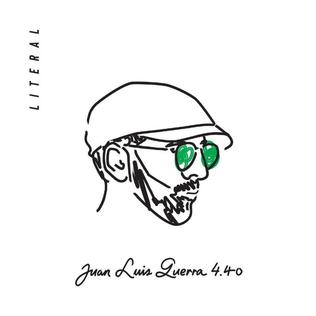
Literal is the 14th studio album by Dominican singer, songwriter and producer Juan Luis Guerra. It was released on 31 May 2019 by Universal Music Latin. Written and produced by Juan Luis Guerra, the album contains eleven tracks and encompasses a variety of tropical genres, such as bachata, merengue, salsa and son along with influences from jazz, gospel, rock and Dominican folk music. The album was co-produced by Guerra's longtime collaboration and musical director Janina Rosado. It has lyrics about romance, love, nostalgia, moving on and protest against corruption.

Entre Mar y Palmera Tour is the title of the world tour of Dominican superstar Juan Luis Guerra and 4:40 to promote his live album of the same title, his EP Prive and to celebrate the 30th Anniversary of his blockbuster album Bachata Rosa. The tour kicked off February 12, 2022, in Punta Cana, Dominican Republic and is expected to end on July 13, 2024 in A Coruña, Spain.

Prive is the first EP by the Dominican artist Juan Luis Guerra. It was released on December 25, 2020, and was distributed Universal Music Latin. It consisted in three new versions of Guerra's previous hits Las Avispas, Ojalá Que Llueva Cafe and Pedir Su Mano with acoustic arrangements and two new songs, Pambiche Pa` Mi Novia which was the lead single and "Donde Naces Tus Besos". The EP production consisted in an intimate sound based and oriented on Son and a slow version of merengue called Pambiche and with elements of jazz, blues, bossa nova and classical music along with the use of instruments piano, guitar, guira, vibraphone and saxophone. Privé was produced by Juan Luis Guerra and co-produced by his longtime arranger Janina Rosado.
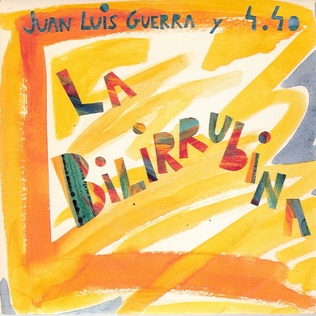
"La Bilirrubina" is a song by Dominican singer-songwriter Juan Luis Guerra. It was written by Guerra and released by Karem Records on 1990 and 1991 in Europe as the second single from his fifth studio album, Bachata Rosa. It was nominated for Record of the Year at 1991 Lo Nuestro Awards. The merengue track is considered one of Guerra's signature songs and most popular. It receive positive reviews and was listed one of the best tracks of the album.
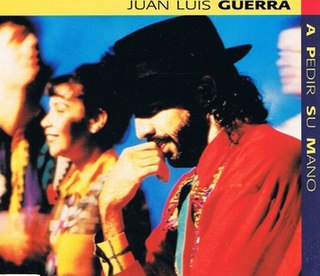
A Pedir Su Mano is a song by Dominican Republic singer-songwriter Juan Luis Guerra released as the fourth single for his album Bachata Rosa (1990). It was released in 1990 by Karem Records and in 1992 on Europe by Ariola. The track is a merengue version of the song “Dede Priscilla,” by Lea Lignazi from the Central African Republic. The track combined music elements of Afropop and zouk with merengue. The music video shows people in traditional African dress dancing in sugarcane fields with a cartoon of a red train traversing the landscape.
"El Farolito" is a song recorded by Dominican singer Juan Luis Guerra for his seventh studio album, Fogaraté (1994), included as its eighth track. It was composed and produced by Guerra and the Dominican accordionist Francisco Ulloa and his band. The track is a Perico Ripiao, better known as merengue tipico, a rural version of merengue and it describes the curves of the body of a lover and his feelings for her. According Guerra, "El Farolito" is his favorite track on the album. The track was received well by the critics and according to some is "a kind of higher-class version of merengue típico".
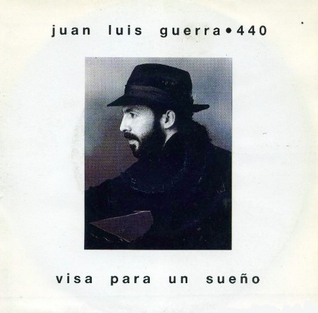
Visa Para Un Sueño(English: Visa for a dream) is the third single by Dominican artist Juan Luis Guerra and his band 440 from their fourth studio album Ojalá Que Llueva Café. Initially released by Karen Records in the Dominican Republic in 1989, it was released a year later in Spain. The track is a merengue providing a social commentary about the difficulties of obtaining a United States visa order to find work, better living conditions, and escape the poverty of third world countries, as well as being about the state of mind that many Dominicans have. The track was inspired by the illegal trips many Dominicans take to Puerto Rico every year to find better living and working conditions.
"Rosalía" is a song recorded by Dominican singer Juan Luis Guerra for his seventh studio album, Bachata Rosa(1990), included as its first and opening track. It was composed and produced by Juan Luis Guerra and his band 4.40. The track is an upbeat merengue about a lover named Rosalia. The track contains poetic metaphors and lyrics describing that he loves her. Following the success of Bachata Rosa, the track charted inside of Panama Airplay. Eventually, the track was included on the live album Entre Mar y Palmeras (2021) and served as the opening track on the setlist of the tour of the same name.

Radio Güira is the second extended play by the Dominican Juan Luis Guerra, released on November 3, 2023 by Rimas Entertainment. Written and produced by Guerra and Janina Rosado, the six track EP is inspired by a radio station broadcast created by Guerra titled 4:40 FM. Exploring a number of different sounds and music genres, the EP encompasses blues, jazz, rock, big band, bachata, mambo, and merengue and includes the participation of pianist Michel Camilo.













